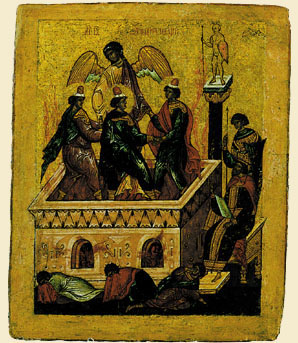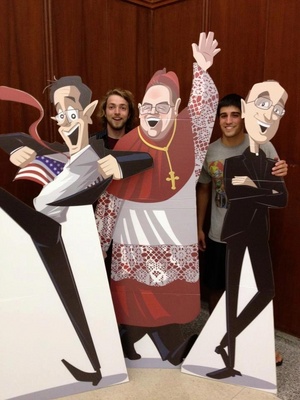Recently I was reading some blog written by a Catholic extolling the virtues of a Melkite parish near to where she lives. Hurray! This woman found peace in the Byzantine East, and Melkite no less. What right-thinking Catholic would dismiss Eastern Christianity? All the things this blogger noted from icons, to incense, to singing the Liturgy, and the priest facing East are good and beautiful things; but the essential was missing from her comments. No mention of Jesus Christ and the personal encounter needed for the attainment of one’s Destiny. One can only say to her list of likes: so what!
The string of pearls this blogger noted are good and essential as they are constituent to an incarnational faith, that is, to our worship of the One Triune God. They are, however, meaningless if not backed by a familiarity with Scripture, an abiding love for the liturgical tradition of the Church, the clear, consistent teaching of the Church, the teachings of the Church fathers and mothers, a personal and ongoing conversion, and a humanity that is happy and making progress in working out salvation. Yet, let’s not confuse personal with private. Let me say it another way: an iconostasis doesn’t save – Jesus does; the icon of the Hospitality of Abraham doesn’t save – Jesus saves; the Trisagion doesn’t save, even if it’s a cool prayer – Jesus does. Unless there is a down-and-dirty conversion from sin to grace no piece of a religious aesthetic is meaningful or redemptive.
Remember that the Servant of God Pope Paul VI said: “the first fruit of the deepening consciousness of the Church itself is the renewed discovery of its vital relationship with Christ. A well-known thing, fundamental, essential, but never quite understood, meditated upon, celebrated enough.”
Yet, the icons, sacred music, gestures, prayers, and sweet smelling air, etc. do contribute to vitality of one’s spiritual itinerary. AND most of all, we need a renewed attention to the lex orandi tradition of the Church not just a moralist view that leads to individualism. “Church things” cultivate the beautiful aspects of Catholic living and thinking, they contribute to the process of conversion because they point to something deeper and more real than not. We are persons and not individuals who need to the beautiful, who need each other.
Today more than ever, following the indications “unto salvation’ of the saints and the angels, plus the authentic teachings and witness of church leaders like Pope Benedict, the Ukrainian Major Archbishop Sviatoslav Shevchuk, Angelo Scola, Massimo Camisasca, Luigi Giussani, Julían Carrón, Enzo Biachi, Chaira Lubich, Sophia Cavelletti, Cristina Canetta and the like is critical for the flowering of the spiritual life. Some of these people are dead. But the point is that we are in desperate need of having a personal relationship with good men and women who point us in the right direction. These Christian leaders, through their writings and the communities they founded, are crucial because it’s only through the personal that we break out of our isolation and I dive into community, especially the community of faith. It is not easy for some to do this; all I ask is that you try. We know that the personal is respected and cherished.
The personal encounter with Jesus the Christ mediated through the Other is the logic of Christianity, indeed, that’s the point of today’s feast of the Guardian Angels: God so loves us that we have others to rely upon to help us on our way. The Guardian Angels help and support this encounter in the guided companionship we call the Church.




